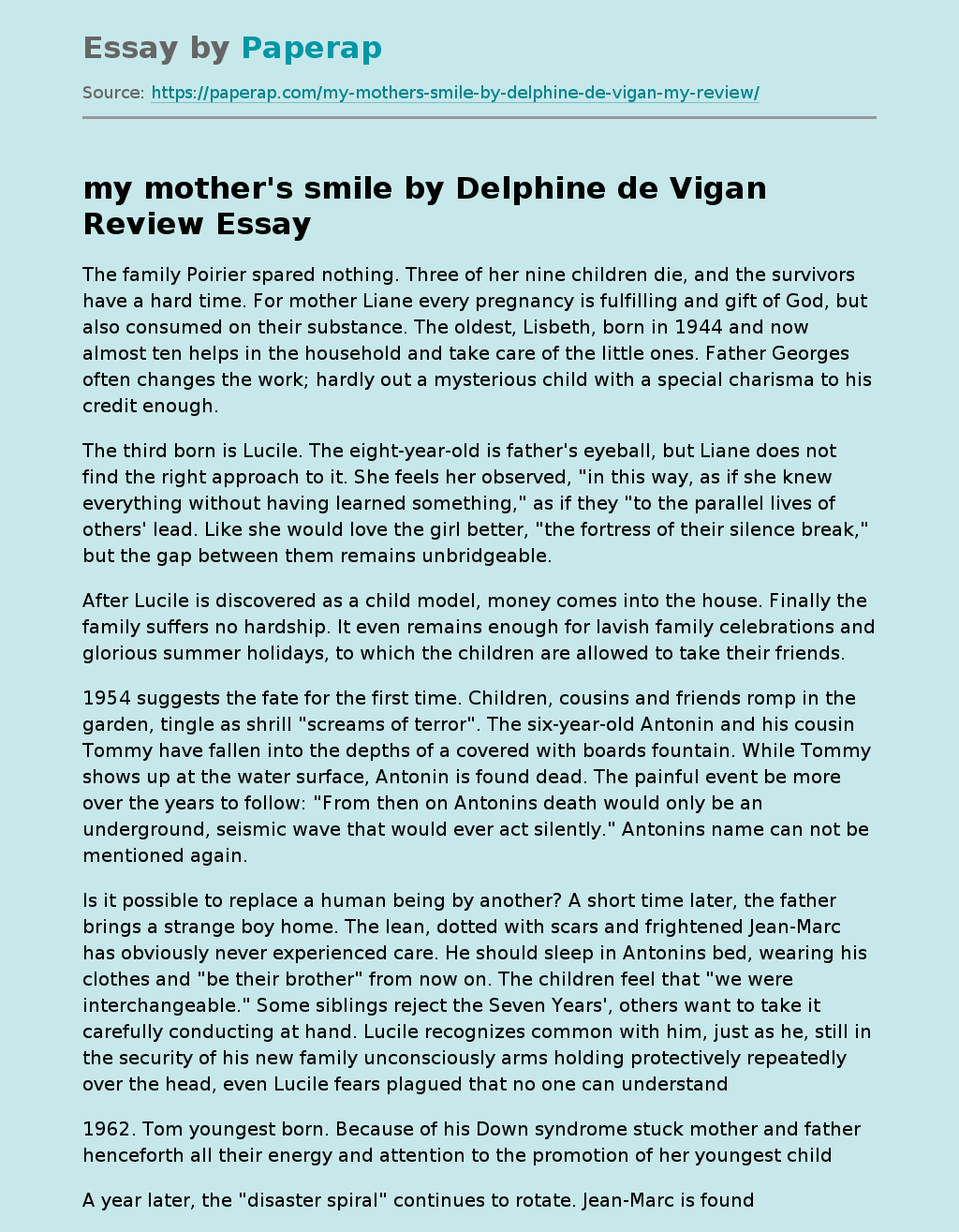The following sample essay is about “my mother’s smile” by Delphine de Vigan . Read the introduction, body and conclusion of the essay, scroll down.
The family Poirier spared nothing. Three of her nine children die, and the survivors have a hard time. For mother Liane every pregnancy is fulfilling and gift of God, but also consumed on their substance. The oldest, Lisbeth, born in 1944 and now almost ten helps in the household and take care of the little ones. Father Georges often changes the work; hardly out a mysterious child with a special charisma to his credit enough.
The third born is Lucile. The eight-year-old is father’s eyeball, but Liane does not find the right approach to it. She feels her observed, “in this way, as if she knew everything without having learned something,” as if they “to the parallel lives of others’ lead. Like she would love the girl better, “the fortress of their silence break,” but the gap between them remains unbridgeable.
After Lucile is discovered as a child model, money comes into the house. Finally the family suffers no hardship. It even remains enough for lavish family celebrations and glorious summer holidays, to which the children are allowed to take their friends.
1954 suggests the fate for the first time. Children, cousins and friends romp in the garden, tingle as shrill “screams of terror”. The six-year-old Antonin and his cousin Tommy have fallen into the depths of a covered with boards fountain. While Tommy shows up at the water surface, Antonin is found dead.
The painful event be more over the years to follow: “From then on Antonins death would only be an underground, seismic wave that would ever act silently.” Antonins name can not be mentioned again.
Is it possible to replace a human being by another? A short time later, the father brings a strange boy home. The lean, dotted with scars and frightened Jean-Marc has obviously never experienced care. He should sleep in Antonins bed, wearing his clothes and “be their brother” from now on. The children feel that “we were interchangeable.” Some siblings reject the Seven Years’, others want to take it carefully conducting at hand. Lucile recognizes common with him, just as he, still in the security of his new family unconsciously arms holding protectively repeatedly over the head, even Lucile fears plagued that no one can understand
1962. Tom youngest born. Because of his Down syndrome stuck mother and father henceforth all their energy and attention to the promotion of her youngest child
A year later, the “disaster spiral” continues to rotate. Jean-Marc is found dead in his room, after he pulled a plastic bag over the head.
Soon leave the parental home, the Great, to study, to work, to start families. they are not happy. Lucile married, eighteen first, but she is unfaithful to her husband, the marriage breaks down quickly; she gets custody of the daughters Delphine (the author) and Manon. The single mother takes refuge in varying love relationships. Niels, one of her lover, kills 1970. 1978 her brother Milo shoots at age 28. Later, he follows her cousin Baptiste to death.
On January 25, 2008 will Dolphins, meanwhile, a recognized writer, her mother dead in her small Parisian apartment. The daughter is unresponsive to scream incapable, unable to understand. When the state of shock dissolves slowly, it begins with their project, the autobiographical novel ” Rien ne s’oppose à la nuit < ” Delphine de Vigan: “Rien ne s’oppose à la nuit” in ”
It is a complex, painful process. What a “tribute” to be “a coffin made of paper” for her mother, develops into a search “for the origin of suffering.” What has “violated the core of their personality to final and irreversible manner” to? Delphine’s husband feels overloaded which tension on his wife, and asks if she should really write about “that.” But there is for them nothing else more than to bring the inexpressible on paper – as self-therapy to stay afloat in the face of their own pain into speechlessness and self-destruction. You will also learn a lot about yourself and check.
They interviewed her sister Manon, other relatives, friends. The mother’s voice is absent; she had never coherently told from her childhood. Dolphins can remember “fragmentary remarks” that had fallen here and there; it seemed to “take a throw (Lucile) with stones to us with full force or to free themselves from the worst”.
Dolphins reading diary entries and letters, police reports and psychiatric reports, she hears cassettes her grandfather Georges has discussed. It has its limits: “Did I write the law that Georges was a malicious, destructive and humiliating father that he raised his children to heaven, encouraged … has idolized and simultaneously destroyed … that he can? had given daughters at least ambiguous relationships? “<
From page to page, the daughter approaches the essence of their mother, who saw suicide as the only way forward. In retrospect, she watches them – with new lovers as it curls up in her bedroom, smokes, takes drugs, can not participate in life, money they need themselves urgently distributed to strangers, how the budget degenerates as she moves again and again with her daughters. As threatened in delusion Manon with acupuncture needles, naked with weißbemaltem body at the window visible so that the police come and she is admitted to a psychiatric ward. You undergoing therapy – not for their own, but only “for our sake” – but everything bounces off their inner emptiness. Twenty years she struggles with her bipolar disorder. Drugs, therapies, stays in hospitals, at the end of lung cancer they wear down. In her suicide note she asks her children to understand their decision: “I would rather die alive.”
My Mother’s Smile by Delphine de Vigan. (2019, Nov 18). Retrieved from https://paperap.com/my-mothers-smile-by-delphine-de-vigan-my-review/

